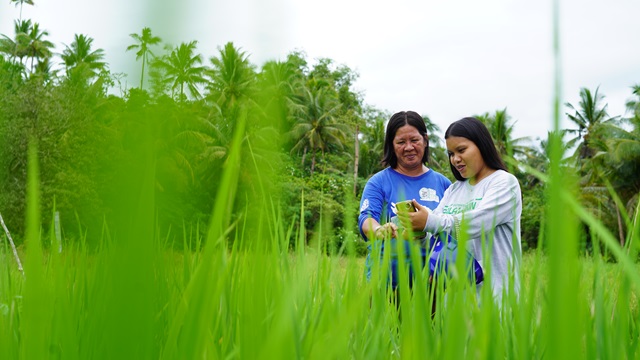
A pioneering movement is taking shape, driving a transformation in traditional rice farming practices in Leyte.
One of the drivers of change is Engr. Fermina Aling, a 69-year-old visionary farmer, and owner of JAMPOL Integrated Farm School, who has embraced the theory of digitalization to propel her community toward a future of agricultural prosperity. With the help of innovative applications, Fermina and her fellow farmers are unlocking the potential of digital agriculture to overcome challenges and enhance productivity.
Hailing from Alangalang town, Fermina discovered the promises of digitalization in agriculture through her training at PhilRice’s Training of Trainers (TOT) program. Further honing her knowledge through the Digital Agriculture Course (DAC) training provided by Agricultural Training Institute (ATI), Fermina embarked on a mission to promote digital tools among rice farmers, empowering them to adapt to the rapidly evolving agricultural landscape.
“Using these applications at my age has never been a problem. It has given me more ease in monitoring the farm. With a swipe of a finger, the information that I need is already provided for me,” said Fermina.
The key to this agricultural renaissance lies in her adoption of rice applications tailored for the modern-day farmer. Among these, she uses the Binhing Palay app and it has become a go-to resource, offering a comprehensive catalog of Philippine rice varieties with various filters for easy selection-based on location, environment, and season. She also utilizes the MOET (Minus-OneElement Technique) app that simplifies fertilizer management, allowing farmers to compute the appropriate field fertilizer requirement or predict rice yields based on personalized fertilization plans.
“I used to input the field fertilizer requirements and do the calculations manually, but with the use of the MOET app, it does the computation for me,” she said.
She also uses the LCC (Leaf Color Chart) app, which provides real-time fertilizer recommendations. Leveraging artificial intelligence, she tries out the eDamuhan to help her identify weeds and manage them.
Empowering farmers through digital marketing
Fermina’s vision extends beyond the fields to the digital realm, as she explores the power of social media and digital marketing in promoting agricultural products. Recognizing the impact of captivating pictures and compelling advertisements, she advocates that farmers leverage social media platforms like Facebook to reach wider audiences and showcase their produce.
“Using social media is one of the fastest ways to promote our products as everybody is using it. You just have to use it wisely to reach your target audience,” she said.
Moreover, her training has introduced her to e-banking, enabling wired farmers to embrace digital payment methods for added convenience and efficiency in financial transactions.
A testament to success
Mirroring Fermina’s endeavors is Rosalie Badajos, a 29-year-old farmer technician at ALDE Farm in Babatngon, Leyte. Rosalie has seamlessly integrated rice applications into her daily field monitoring routines. Embracing the MOET, AgriDoc, LCC, and Binhing Palay apps, Rosalie has experienced the time-saving and efficiency-boosting capabilities of these digital tools.
Through her active engagement on social platforms, she has successfully introduced cutting-edge technologies and farming practices to her peers, encouraging broader participation in agricultural activities.
“Being active on social media is also one way to promote digital agriculture because by promoting our farm school, technologies, and farming practices, it encourages farmers to take part in our activities,” Rosalie said.
Rosalie shared how they once posted in their Facebook page about the use of rice bug attractants in the rice field to minimize infestations, and it piqued the interest of many farmers. This post eventually led to other farmers adopting the technology in their areas.
“As a daughter and a technician, I have also shared these rice applications with my parents. I can attest that these applications have helped me greatly in my field monitoring. These apps are meant to be shared,” Rosalie declared.
Challenges and solutions
While digitalization opens new horizons, it is not without challenges. Fermina and Rosalie acknowledge that limited access to digital phones, internet connectivity, signal problems, and difficulties in navigating apps can hinder some farmers from fully benefiting from these tools. To address this, they highlight the importance of alternative information avenues such as the PhilRice Text Center (0917-111-7423).
The journey of Fermina and Rosalie exemplifies the incredible potential of digitalization in agriculture. Through their dedication and enthusiasm, they have become agents of change in their communities, transforming traditional farming into a dynamic, technologydriven enterprise. As Leyte farmers continue to embrace digital agriculture, they pave the way for a brighter and more sustainable future in the world of rice farming.




